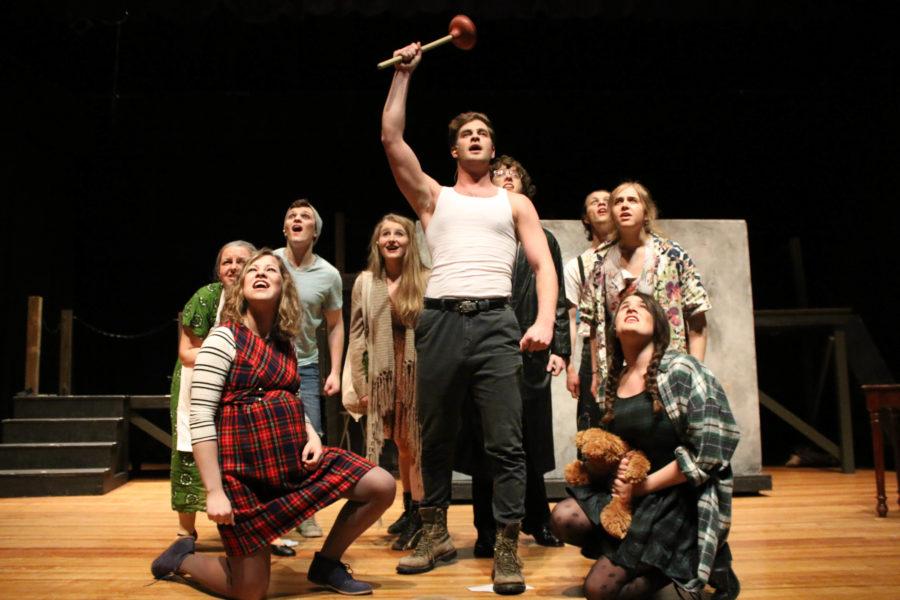University musical takes stand on social issues
March 13, 2016
In a dystopian society, citizens living under a tyrannical government are forced to pay to use the bathroom because of a drought. Corrupt government leaders take advantage of the lower class citizens by pocketing the money instead of using it to solve the town’s environmental issues — until a civilian named Bobby Strong decides to lead the town in a social movement to tear down the government and eliminate restroom fees.
Illinois Student Musicals, or ISM, put on the production, Urinetown, this past Friday through Sunday in Gregory Hall. The musical covered a wide variety of social issues such as water conservation, police brutality and an increasing gap between upper and lower class citizens. The musical also incorporated heavy comedy, romance and lighthearted music and dance scenes.
David Naber, president of ISM, played Officer Lockstock, who helped narrate the musical. He said the musical made him realize how different his life would be if he were in a different financial status.
Naber also said that he has started to look at how little lifestyle changes can make a big impact on the environment.
“It’s made me much more conscious of how much (water) I use on a daily basis. Nowadays, I constantly think about how much water I am using and the toll I am taking on the environment,” Naber said.
Get The Daily Illini in your inbox!
One of Officer Lockstock’s final lines in the production is, “You think people want to know that their way of living is unsustainable.”
If there were one thing that audience members take away from the show, Naber hopes it is that conservation of Earth’s resources is not a concept to be taken lightly.
“There’s a lot of harsh realities in the world and the amount of resources we have is one of the biggest that we have to come to terms with. I hope that people reflect on that after they walk out of the show and think about how they can be more kind to their fellow man and also to the earth as well,” Naber said.
Mary Di Leo, general board member of ISM, played Little Sally in the musical and was a co-narrator alongside Naber.
She said that, at first, it was difficult to portray her character because she plays a child and it was challenging to play someone so young. She also said that in the beginning of the musical her character is a timid child, but when the revolution starts, Little Sally gains more confidence and stands up for herself.
“I think that (children in the audience) should see that you can be strong, stand up for what you believe in and not worry about being belittled and put down just because you’re younger. You can believe in something and be right no matter what age you are,” Di Leo said.
Aside from performing in musicals, ISM also does charity work around the Champaign-Urbana area. They sing in nursing homes, perform for the boys and girls club, and every fall, they have a walk for suicide prevention.
“I think that it’s really important for us to do these charity events because theater (isn’t just about) performing in front of an audience, but getting a story out to people,” Di Leo said.
Jesse Trieger, who plays Bobby Strong, the lead role in the musical, said that his main goal behind playing Bobby wasn’t to advance his own personal gain but to do a good job for ISM as a whole.
Trieger’s character leads the revolution to bring down the government and make the town’s amenities free for the public. Trieger talked about the similarities between him and his character.
“I would like to think that I am a natural born leader. Strength, I try to bring that out of myself and out of Bobby as much as possible. One definite similarity is that we both have a problem with authority,” Trieger said.
Trieger said that it’s important that society continues to fight for social justice.
“You can’t make money off of people’s basic human dignities. It’s about fighting for what is right now, it’s fighting for what’s right in the long term. When you’re fighting for what it means to be a human being today, then you have a longer tomorrow,” Trieger said.







